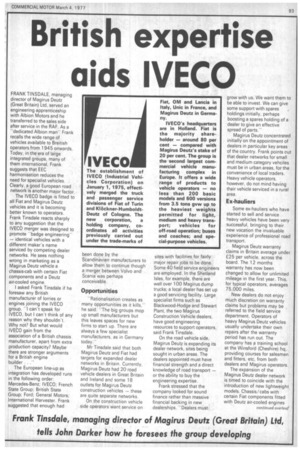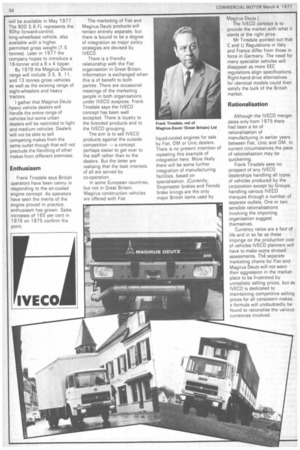British expertise aids IVECO
Page 99

Page 100

If you've noticed an error in this article please click here to report it so we can fix it.
FRANK TINSDALE, managing director of Magirus Deutz (Great Britain) Ltd, served an engineering apprenticeship with Albion Motors and he transferred to the sales side after service in the RAF. As a -dedicated Albion manFrank recalls the wide range of vehicles available to Breitish operators from 1945 onwards. Today, in the era of large integrated groups, many of them international. Frank suggests that EEC harmonisation reduces the need for specialist vehicles. Clearly, a good European road network is another major factor.
The IVECO badge is fitted to all Fiat and Magirus Deutz vehicles and it is becoming better known to operators. Frank Tinsdale reacts sharply to any suggestion that the IVECO merger was designed to promote 'badge engineering-identical vehicles with a different maker's name serviced by competing dealer networks. He sees nothing wrong in marketing as a Magirus Deutz vehicle a chassis-cab with certain Fiat components and a Deutz air-cooled engine.
I asked Frank Tinsdale if he foresaw any British manufacturer of lorries or engines joining the IVECO group. "I can't speak for IVECO, but I can't think of any reason why they shouldn't Why not? But what would IVECO gain from the association of a British chassis manufacturer, apart from extra production capacity? Maybe there are stronger arguments for a British engine builder . . ."
The European line-up as integration has developed runs in the following order: Mercedes-Benz; IVECO; French State Group; British State Group; Ford; General Motors; International Harvester. Frank suggested that enough had been done by the Scandinavian manufacturers to allow them to continue though a merger between Volvo and Scania was perhaps conceivable.
Opportunities
' 'Rationalisation creates as many opportunities as it kills," he said. -The big groups mop up small manufacturers but this leaves spaces for new firms to start up. There are always a few specialist manufacturers, as in Germany today."
Mr Tinsdale said that both Magirus Deutz and Fiat had targets for expanded dealer networks in Britain. Currently, Magirus Deutz had 20 road vehicle dealers in Great Britain and Ireland and some 18 outlets for Magirus Deutz construction vehicles -these are quite separate networks.
On the construction vehicle side operators want service on sites with facilities for fairly major repair jobs to be done. Some 40 field service engineers are employed. In the Shetland Isles, for example, there are well over 100 Magirus dump trucks; a local dealer has set up a good servicing facility. Large specialist firms such as Blackwood-Hodge and Stewart Plant, the two Magirus Construction Vehicle dealers, have good engineering resources to support operators, said Frank Tinsdale.
On the road vehicle side, Magirus Deutz is expanding its dealer network, sites being sought in urban areas. The dealers appointed must have financial strength and a direct knowledge of road transport -or the ability to buy the engineering expertise.
Frank stressed that the company looked for sound finance rather than massive financial backing in new dealerships. "Dealers must grow with us, We want them to be able to invest. We can give some support with spares holdings initially, perhaps boosting a spares holding of a dealer to give an effective spread of parts.'' Magirus Deutz concentrated initially on the appointment of dealers in particular key areas of the country. Frank points out that dealer networks for small and medium category vehciles must be in urban areas, for the convenience of local traders. Heavy vehicle operators, however, do not mind having their vehicle serviced in a rural area.
Ex-hauliers
Some ex-hauliers who have started to sell and service heavy vehicles have been very successful, bringing to their new vocation the invaluable experience of professional road transport.
Magirus Deutz warranty claims in Britain average under E25 per vehicle, across the board. The 12 months warranty has now been changed to allow for unlimited mileage in the first year. This, for typical operators, averages 75,000 miles.
New dealers do not enjoy much discretion on warranty claims but problems may be referred to the field service department. Operators of heavy Magirus Deutz vehicles usually undertake their own repairs after the warranty period has run out. The company has a training school at the VVinsford (Cheshire) hq, providing courses for salesmen and fitters, etc, from both dealers and Magirus operators.
The expansion of the Magirus Deutz dealer network is timed to coincide with the introduction of new lightweight models. Chassis/cabs with certain Fiat components fitted with Deutz air-cooled engines :
will be available in May 1977. The 90D 5.6 FL represents the 90hp forward-control, long-wheelbase vehicle, also available with a higher permitted gross weight (7.5 tonnes). Later in 1977 the company hopes to introduce a 16-tonner and a 6 x 4 tipper.
By 1978 the Magirus Deutz range will include 3.5, 9, 11 , and 13 tonnes gross vehicles as well as the existing range of eight-wheelers and heavy tractors.
I gather that Magirus Deutz heavy vehicle dealers will handle the entire range of vehicles but some urban dealers will be restricted to light and medium vehicles. Dealers will not be able to sell competing makes from the same outlet though that will not preclude the handling of other makes from different premises.
Enthusiasm
Frank Tinsdale says British operators have been canny in responding to the air-cooled engine concept. As operators have seen the merits of the engine proved in practice, enthusiasm has grown. Sales increases of 1 65 per cent in 1 976 on 1 975 confirm the point. The marketing of Fiat and Magirus Deutz products will remain entirely separate, but there is bound to be a degree of integration as major policy strategies are devised by IVECO.
There is a friendly relationship with the Fiat organisation in Great Britain. Information is exchanged when this is of benefit to both parties. There are occasional meetings of the marketing people in both organisations under IVECO auspices. Frank Tinsdale says the IVECO concept has been well accepted. There is loyalty to the branded products and to the IVECO grouping.
The aim is to sell IVECO products against the outside competition -a concept perhaps easier to get over to the staff rather than to the dealers. But the latter are realising that the best interests of all are served by co-operation.
In some European countries, but not in Great Britain, Magirus construction vehicles are offered with Fiat liquid-cooled engines for sale by Fiat, OM or Unic dealers. There is no present intention of repeating this example of integration here. More likely there will be some further integration of manufacturing facilities, based on specialisation. (Currently, Stopmaster brakes and Ferodo brake linings are the only major British items used by Magirus Deutz.) The IVECO concept is to provide the market with what it wants at the right price.
Mr Tinsdale pointed out that C and U Regulations in Italy and France differ from those in force in Germany. The need for many specialist vehicles will disappear as more EEC regulations align specifications. Right-hand-drive alternatives for identical models could then satisfy the bulk of the British market.
Rationalisation
Although the IVECO merger dates only from 1 975 there had been a lot of rationalisation of manufacturing in earlier years between Fiat, Unic and OM. In current circumstances the pace of rationalisation may be quickening.
Frank Tinsdale sees no prospect of any IVECO dealerships handling all types of vehicles produced by the corporation except by Groups handling various IVECO marques through a number of separate outlets. One or two sensible rationalisations involving the importing organisation suggest themselves.
Currency ratios are a fact of life and in so far as these impinge on the production cost of vehicles IVECO planners will have to make some shrewd assessments. The separate marketing chains for Fiat and Magirus Deutz will not want their aggression in the market place to be frustrated by unrealistic selling prices, but as IVECO is dedicated to maintaining competitive selling prices for all consistent makes, a formula will undoubtedly be found to rationalise the various currencies involved.


























































































































































